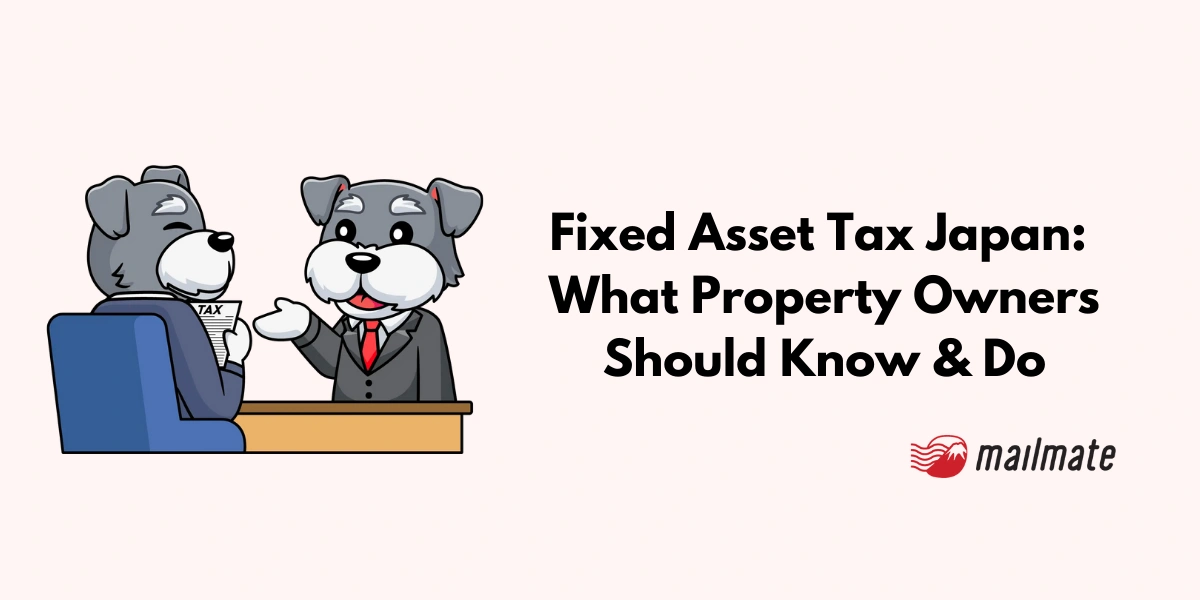Fixed Asset Tax Japan: What Property Owners Should Know & Do

If you're considering buying a property in Japan or are already on your journey toward property ownership, you'll likely hear about fixed asset tax (aka fixed property tax).
This article briefly overviews Japan's fixed asset taxes, explaining what they are, how they are calculated, and how to pay them.
A brief overview of fixed property taxes in Japan
In Japanese, fixed asset taxes are called koteishisanzei (固定資産税 = こていしさんぜい). This tax is levied on land and houses and was first established by the government in 1950. It requires all property owners to pay taxes on their fixed assets.
The tax reform that resulted in this tax bill focused on connecting the benefits that exist between property owners of fixed assets (land, buildings, and depreciable assets) and the administrative services provided by municipalities.
According to Japan's Ministry of Internal Affairs and Communications (MIAC), fixed asset tax revenue is then used by cities and municipalities to fund various initiatives, including the construction of public facilities and welfare-related services.
What qualifies as a fixed asset in Japan?
Any land, buildings, or depreciable assets qualify as a fixed asset in Japan and are subject to fixed asset taxes.
Assets with a "land" designation include residential land, agricultural land, and non-cultivated land (forests, etc.).
Assets with a "building" designation include residential buildings, factories, warehouses, stores, etc.
In short, any and all property in Japan is subject to fixed asset tax, payable to the governing municipality.
The following is a chart from MIAC outlining the fundamentals of the fixed asset tax rate in Japan.
1. Taxable objects |
Land, buildings and depreciable assets |
2. Taxable entities |
All cities, towns and villages (Tokyo Metropolitan Government taxes within the 23 wards of Tokyo) |
3. Taxpayers |
Owners of land, buildings, or depreciable assets (for land and buildings, the owners listed in the land registry are taxed, and for depreciable assets, the owners who have filed a tax return are taxed) |
4. Tax base |
Price (fair market value) |
5. Tax rate |
Standard tax rate: 1.4% |
6. Tax-free point |
Land: 300,000 yen, House: 200,000 yen, Depreciable assets: 1.5 million yen |
7. Assessment Date |
January 1 of the year in which the first day of the fiscal year falls |
Who must pay fixed asset tax?
All owners of property in Japan (regardless of nationality) must pay fixed asset tax and are subject to Japan's fixed assets tax law.
You must pay fixed asset tax if:
✅ Your name is on the property's official registry
✅ As of January 1st of the tax year
This applies even if you are not a tax resident of Japan or a visa holder.
Even though Japan does not require visas for non-Japanese who wish to purchase property in Japan, they still require taxes to be paid on purchased property.
In short, if you own property in Japan (land or buildings) as of January 1st of any tax year, that is to say—if your name is on a property deed on January 1st of any given tax year—you will be required to pay fixed asset tax on that property.
Note: For property owners not living in Japan, MailMate provides a tax representative service allowing you to take care of the acquisition tax without needing to be physically present at your property in Japan.
Fixed asset tax Japan: Key facts
Item |
Details |
Taxable Assets |
Land, buildings, depreciable assets |
Taxpayer |
The property owner registered on Jan 1 |
Tax Base |
Fair market assessed value (評価額) |
Standard Tax Rate |
1.4% |
Tax-Free Thresholds |
Land: ¥300,000 / Building: ¥200,000 / Depreciable assets: ¥1.5M |
Valuation Review Cycle |
Every 3 years |
Assessment Date |
January 1 |
Fixed asset tax vs. city planning tax vs. acquisition tax (comparison table)
Tax Type |
When Paid |
Rate |
Applies To |
Fixed Asset Tax (固定資産税) |
Every year |
1.4% (standard) |
Land & buildings |
City Planning Tax (都市計画税) |
Every year |
0.1–0.3% |
Properties in “city planning zones” |
Acquisition Tax (不動産取得税) |
One time—after purchase |
3–4% |
Real estate purchases |
How is Japan's fixed asset tax calculated?

The formula for how fixed asset tax is calculated is based on (a) the local council's assessed value of your property x (b) the fixed asset tax rate.
Taxable Amount = (Assessed Value of Land + Assessed Value of Building) × Tax Rate
Let’s break down each component.
a. Assessed value of your property (land and buildings)
Municipalities calculate the assessed value of land and buildings based on fixed asset assessment standards set by the national government, which are reviewed every three years.
The assessed value of land is calculated based on approximately 70% of the official land price, which the government is required to announce once a year.
Note: The local tax office calculates the fixed asset tax on land, so property owners do not need to calculate it themselves.
The tax amount for the assessed value of buildings is calculated based on (1) the construction cost of the price it would take to build an identical house in the same location and (2) minus depreciation for the years since the house was built.
b. Fixed asset tax rate
The fixed asset tax rate is generally 1.4%, but the tax rate may vary from city to city.
If you're about to purchase a property in Japan and you're wondering how much your real estate taxes might be, you can use MailMate's property tax calculator to get a general idea of your upcoming tax obligations.
c. Reductions and exemptions
There are exemptions and reductions to Japan's fixed asset tax that are available to property owners. Here's a brief list of possible exemptions and reductions that may apply, depending on your circumstances and your governing municipality:
For newly constructed homes, a reduction of 1/2 to 2/3 of the tax is available for 2-3 years.
Reduction or exemption for properties owned by seniors or disabled individuals, implemented at municipal government discretion.
Deductions to promote earthquake-resistant renovation.
Special tax rates for agricultural lands being converted for other uses.
Partial or full tax exemptions for properties damaged by natural disasters, as well as the duration and extent of the exemption, depend on damage severity, as outlined in local government disaster relief tax provisions.
Full or partial tax exemptions for properties designated as cultural heritage sites, managed under the Cultural Properties Preservation Law.
Full example calculation
Scenario:
You own a home in Saitama purchased in 2024.
Assessed land value: ¥12,000,000
Assessed building value (after depreciation): ¥6,000,000
Total assessed value: ¥18,000,000
Formula: 18,000,000 × 1.4% = ¥252,000 per year
If exemptions apply (such as new-home reductions), the tax amount decreases—but only after applying municipal rules.
How to pay your fixed asset tax bill
The city or town where your land or house is located generally sends property tax notices in April or May each year. Payment methods and due-by dates vary by city, so please refer to the payment instructions included with the bill.
The fixed asset tax bill will be sent to your registered property. You can pay it at your local city office, a convenience store transfer, or the post office.
The bill can be paid in four installments (four payment slips are enclosed) but can also be paid all together at once (as a lump sum).
If you prefer to pay the bill in four installments, then you'll want to check each bill's payment-due date.
If you pay all four bills at once, make sure that you're paying before the first bill is due.
If you live abroad, the bill cannot be forwarded internationally unless you designate a domestic representative.
Penalties for non-payment of fixed asset taxes
Non-payment of fixed asset taxes is subject to late fees (an additional 8.7% of your tax bill per year after one month has passed), so if you're a non-resident property owner, it's wise to have a plan for managing property taxes.
Frequently asked questions
What is fixed asset tax?
Fixed asset tax is levied on anyone registered as a property owner on January 1st of the given year. The tax is paid at the municipal level, and the tax revenue is subject to the municipalities' direction on how it will be used.
How is fixed asset tax different from city planning tax?
In Japan, fixed asset tax applies to all land and properties regardless of location. City planning tax, however, only applies to areas that fall within a "city planning" area.
What is registration and license tax? Is it the same as fixed asset tax?
Registration and license tax in Japan is a one-time tax paid during the real estate purchase process. On the other hand, fixed asset tax is an annual, recurring tax levied on all property owners of Japanese property.
In closing
Fixed asset tax is part of the financial obligation of owning land or a house (building) in Japan.
Knowing when your bill is due and how to pay it will give you peace of mind that you're complying with Japanese tax law.
For any non-resident property owners, consider using a tax representative service like MailMate, which can serve as a liaison between you and the local tax authorities.
MailMate's fluently bilingual tax representative service helps property owners stay up to date on their real estate tax bills by liaising between clients and the local government.

The service includes the following features:
Tax representative for annual real estate tax payments
Domestic point of contact for authorities (required by law)
Bill pay support for property tax payments
Tax notifications with English summaries
A virtual mailbox to receive the mail that arrives at your Japanese property
Manage important property documents and notifications in one place
Other services MailMate offers include utility and Internet setup of your Japanese property!
Founded in 2019, MailMate has simplified property ownership for foreigners living abroad and is an increasingly popular option recommended by users and well-known industry figures.

Additionally, if you use MailMate's tax representative service for property owners, MailMate will take care of filing the tax representative form with the relevant tax office on your behalf.
Navigate Japan's tax system with an experienced tax representative service tailored for foreign property owners!
Spending too long figuring out your Japanese mail?
Virtual mail + translation services start at 3800 per month. 30-day money-back guarantee.

